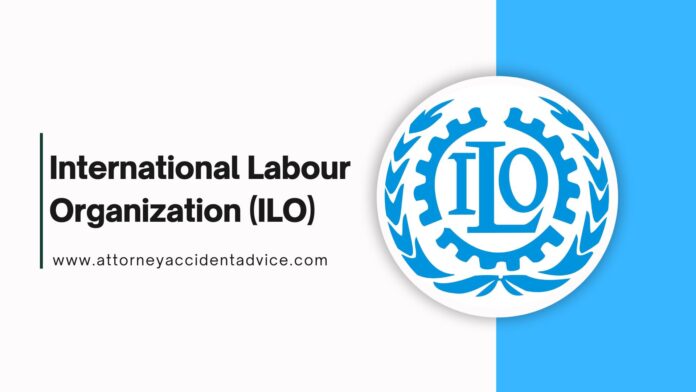In accordance with the Versailles Treaty, The International Labour Organization ILO was established in 1919. Geneva, Switzerland. Social partners unique voices are heard by employees, employers, and governments thanks to its distinctive tripartite structure, which ensures that labor standards accurately reflect their opinions. Also in shaping policies and programmers. It became the first UN-wide specialized agency in 1946. To achieve social justice and peace among nations, the ILO embodies a vision of universal, compassionate labor conditions.
International Labour Organization was one of the first organizations to deal with labour issues. The ILO‘s initial and most significant task has been to create, promote, and monitor international labor standards. To date, the organization has created 189 globally applicable, legally binding Conventions and 202 legally non – binding Recommendations for the regulation of labour conditions.
International Labour Standards
The ILO sets international labour standards through various conventions, which are ratified by member nations. These are non-binding.
The International Labour Conference adopts conventions drafted by the ILO with input from governments, workers and employers’ groups.
By ratifying an ILO convention, a member nation accepts it as a legally binding document. Many countries use these conventions as a document to bring their national laws in line with international labor laws.
The Decent Work Agenda
One of the key objectives of the International Labour Organization (ILO) is to promote social dialogue, social protection and job creation as well as to provide decent work for all under international labour standards.

Trade Organizations in the ILO
Trade organizations represents labour force through national trade organizations, also plays crucial role in the ILO’s policy development. The Bureau of Labour Activities in the Secretariat focuses on strengthening independent and democratic trade organizations. Which enables them to better defend workers’ rights and interests.
- Supervisory role of the ILO
- The ILO monitors the implementation of ILO conventions ratified by Member States.
- The Committee of Experts on the Implementation of Conventions and Recommendations.
- The Tripartite Committee of the International Labour Conference on 5. the Implementation of Conventions and Recommendations. Member States are also required to report on the progress of implementation of conventions they have ratified.
ILO International Labour Organization Complaints
The ILO files complaints against organizations that violate international rules; however, it does not impose sanctions on governments.
Complaints against Member States may be filed if they fail to comply with ILO conventions they have ratified. Any Member State that has signed the same convention and serves as a representative to the International Labour Conference or the ILO’s governing body can submit a complaint.
ILO Global Commission on the Future of Work
- The formation of the ILO Global Commission on the Future of Work marks the second phase in the ILO Future of Work Initiative.
- President Cyril Ramaphosa and Prime Minister Stefan Löfven co-chaired the event.
- The Commission outlines a human-centred agenda based on investing in people’s capabilities, institutions and sustainable work.
- It has undertaken an in-depth examination of the future of work that can provide an analytical basis for the delivery of social justice in the 21st century.
- It highlights the challenges posed by new technologies, climate change and population and calls for a collective global response to the disruptions they are causing in the world of labour.
- Artificial intelligence, automation and robotics will result in a reduction in employment opportunities as old skills become obsolete.
International Labor Law Recommendations are:
- A universal labour guarantee that protects the fundamental rights of workers, ensuring an adequate wage, reasonable working hours and safe workplace.
- A social security guarantee from birth to old age that supports people’s needs.
- A universal right to lifelong learning that enables people to acquire skills, reskill and upskill.
- Managing technological change to promote decent work, including an international governance system for digital labour platforms.
- Greater investment in care, green and rural economies.
- A transformative and measurable agenda for gender equality.


International Labour Organization( ILO)